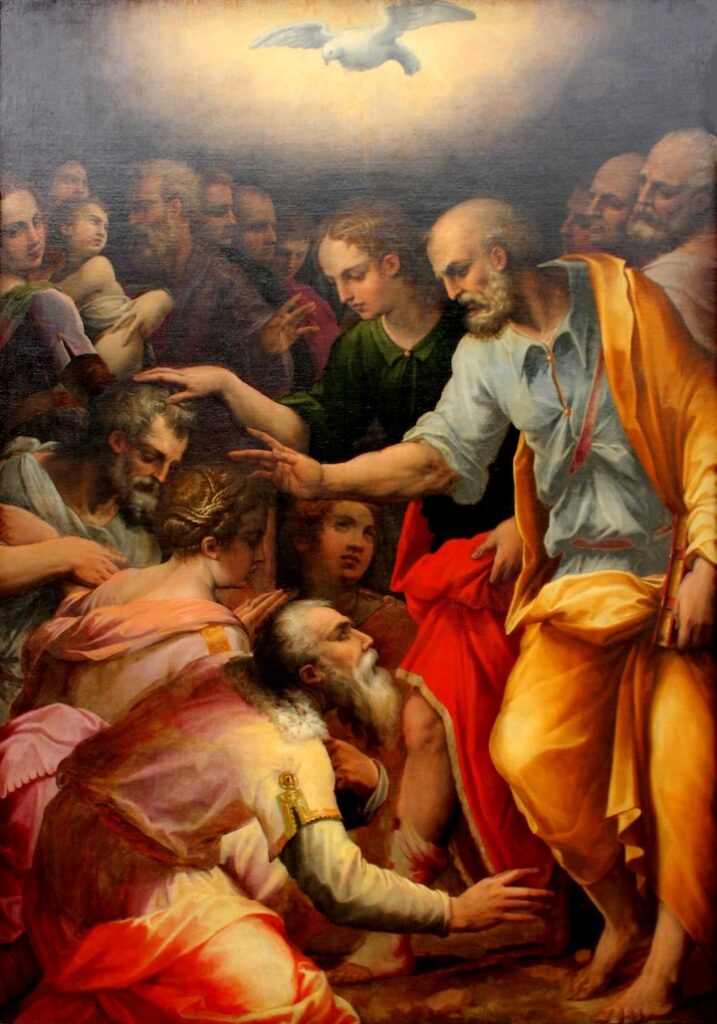Recently, when I was working on my theological interpretation of the Acts of the Apostles, Jesus Being Jesus, I read a passage that initially baffled me. Philip goes to a town in Samaria. There he “proclaimed to them Christ,” and “the multitudes with one accord gave heed to what was said by Philip” for he also worked many signs of healing in Jesus’ name. “So, there was much joy in the city.” (Acts 8:5-8) Philip’s preaching and working of signs resulted in many being “baptized, both men and women.” (Acts. 8:12)
When the apostles in Jerusalem heard of the conversion of the Samaritans, they sent Peter and John to the city. They did so for one express purpose. They were sent so that those who were baptized “might receive the Holy Spirit, for the Spirit had not yet fallen on any of them, but they had only been baptized in the name of the Lord Jesus. Then, they laid their hands on them, and they received the Holy Spirit.” (Acts 8:14-17)
What is one to make of this? In his Pentecost discourse, Peter exhorted his listeners: “Repent, and be baptized every one of you in the name of Jesus Christ for the forgiveness of your sins; and you will receive the gift of the Holy Spirit.” (Acts 2:38) Undoubtedly, one receives the Holy Spirit when baptized. In John’s Gospel, Jesus is very clear, when speaking to Nicodemus – only through the life-giving waters of baptism is one reborn in the Holy Spirit and so enters God’s Kingdom. (cf. Jn. 3:5)
If such is the case, how are we to understand, despite the Samaritans being baptized and so receiving the Holy Spirit therein, Luke’s declarative statement? Without any hesitation, he declared that the Samaritans needed to receive the Holy Spirit, “for the Spirit had not yet fallen on any of them, but they had only been baptized in the name of the Lord Jesus.”

Traditionally, both in the Western and Eastern ecclesial traditions, this passage has been interpreted as distinguishing the Sacrament of Baptism from that of the Sacrament of Confirmation. One receives the Holy Spirit when one is baptized, and then one further receives the Holy Spirit when one is confirmed – a strengthening of the Spirit whereby one is empowered to defend and profess the faith.
This difference is true, and the text did give rise to this sacramental distinction. Nonetheless, it is an unhistorical interpretation, that is, it is an interpretation that is not faithful to what the text historically portrays in the Acts of the Apostles. The text has nothing to do with the distinction between Baptism and Confirmation.
For a proper understanding of what took place in Samaria when Peter and John laid hands on those baptized, we need to revisit what took place at Pentecost. In that event the apostles “were all filled with the Holy Spirit and began to speak in other tongues, as the Spirit gave them utterance.” (Acts 2:4) Thus, when the Spirit came upon them on Pentecost, they were baptized, and so empowered to baptize others who came to faith in Jesus.
Moreover, they were further empowered “to speak in other tongues.” Thus, within this Pentecost event there resides both the institution of the sacrament of Baptism as well as what came to be called the charismatic or spiritual gifts of the Spirit, such as the ability to heal, perform exorcisms, work miracles, and speak in tongues.
In Acts, the apostles not only speak in tongues, but they also healed the sick and cast out demons. The apostles implemented the fullness of their Pentecost experience both by way of baptizing and by way of exercising the charismatic gifts.
When Peter and John, therefore, came to Samaria and laid hands upon those who were already baptized, they did so that they might receive their share of the charismatic gifts of the Spirit – that their full apostolic Pentecostal experience might be the same apostolic experience of the Samaritans as well.
Thus, Luke’s original baffling declaration is now clarified. What took place in Jerusalem on Pentecost now has taken place in a town in Samaria. Having completed their apostolic Pentecostal mandate, Peter and John “returned to Jerusalem.” (Acts 8:25)
By way of conclusion, I want to comment on a contemporary ecclesial phenomenon. It strikes me that the Charismatic or Pentecostal Renewal within all the Christian communities presently exemplifies what took place among the Samaritans and within the whole apostolic Church.
Significantly, as Pentecost was not of human origin, but a sovereign work of God, so there is no human initiator of the present Charismatic or Pentecostal revival. It, too, is of divine origin. Within the charismatic context, Christians who have been baptized and confirmed, and so who received the Holy Spirit, are now prayed over and hands are laid upon them so that the Holy Spirit might “fall upon” them.
The effect of which is that Jesus comes vibrantly alive within them. They now possess a personal relationship with Jesus as their Lord and Savior. Moreover, they receive and manifest, as God determines for each, the various charismatic or spiritual gifts of the Spirit. They have now shared in the entire apostolic Pentecostal experience.
Furthermore, they also become some of the most effective Christian evangelists. For often, as with the apostles and Philip, their preaching of the word is accompanied by miracles, healings, and exorcisms. Significantly, as well, throughout the Church’s history, most of the saints, if not all of them, manifested the charismatic gifts of the Spirit, performing miracles, healings, and exorcisms. They did so in their own apostolic endeavors to renew the Church and evangelize the world.
Thus, when we pray today for a new Pentecost, we are petitioning Jesus to pour out his Spirit upon all of us so that we might receive, in all its fullness, the same Pentecostal experience as did the apostles, and so with all the Saints we might renew the face of the earth.















